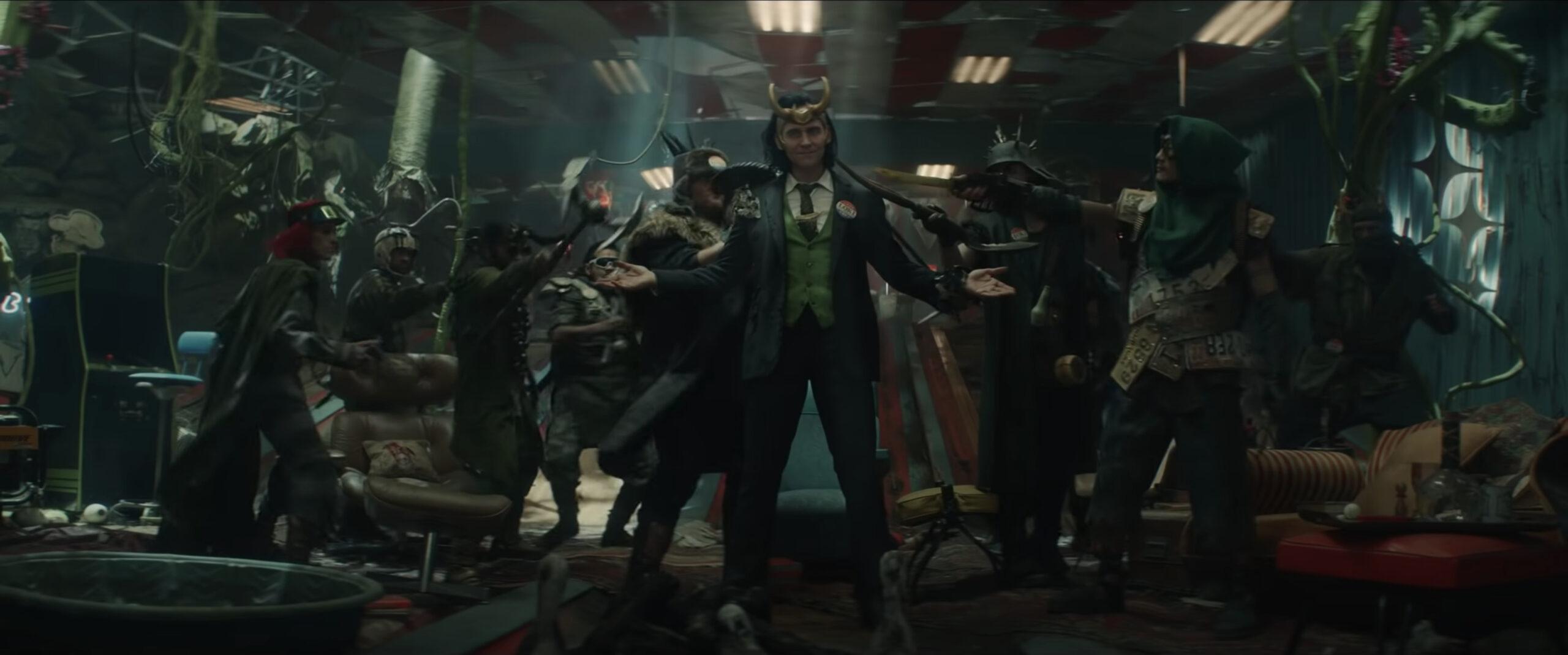In the opening scene of 2018’s Avengers: Infinity War, Loki (Tom Hiddleston) tries to pull off a bit of his trademark trickery to save his brother Thor and prevent an Infinity Stone from falling into the hands of Thanos. He feigns fidelity to the Mad Titan and draws a knife to his throat, only for Thanos to catch Loki’s hand, and proceed to squeeze the life out of him.
“No resurrections this time,” Thanos says, as he drops Loki’s corpse in front of a helpless, subdued Thor.
While the big, purple villain wasn’t exactly wrong about Loki finally dying (after seeming to meet his demise multiple times across several films), the God of Mischief will nevertheless make his triumphant return on Wednesday with the premiere of Loki on Disney+.
Since his debut in 2011’s Thor, Loki has played a greater range of roles than perhaps any other character in the Marvel Cinematic Universe. He’s been a traitor and (briefly) a king in Thor, a full-on antagonist and supervillain in The Avengers, an antihero in Thor: The Dark World and Thor: Ragnarok, and, finally, Asgard’s martyr in Infinity War. Now, Loki becomes the star of the show for the very first time.
Just as Vision found himself suddenly alive again to play the second lead in WandaVision after being killed in Infinity War, Loki has been reborn to lead a series of his own. But rather than be little more than a projection of Wanda Maximoff’s grieving imagination, Loki is actually alive—albeit thanks to a sneaky loophole fit for the comics. The Loki we will soon be reintroduced to is a version of the character who never experienced the redemption arc his character completed in Infinity War, but rather one who was headed to imprisonment on Asgard after bringing an alien army to destroy New York at the conclusion of Avengers. When the Avengers traveled back in time to rescue the Space Stone in Endgame, Past Loki made his escape—so while Main Timeline Loki is long gone, a different version of him lives on in an alternate timeline. Accordingly, the new series will not only double down on the time-traveling sci-fi component of Endgame, but it will also mark the MCU’s greatest universe-expanding multiverse experiment to date.
All of this is to say, things will probably get a little confusing, and definitely a little weird. (Did I mention that Owen Wilson is costarring in this show? I can’t hear your reaction to that, but hopefully it’s a big “wow.”) To help refresh your memory of Loki’s long cinematic journey and prepare you for the upcoming six-episode series, we’re going to examine the multiple timelines to remember and which comic books to consider heading into the premiere, while also exploring how Loki may fit into the larger picture of the MCU.
Timelines
Following Loki’s failed attempt to bring the Tesseract (which contains the Space Stone) to Thanos and subjugate Earth with an alien invasion, Loki’s reign of terror in 2012’s Avengers ends with him in handcuffs. Thor brings his mischievous brother back home to Asgard to answer for his crimes, where he eventually serves time in a cell in Dark World. But the version of Loki that we’ll see in the new series never made it back to Asgard.
After Thanos snapped away half the world’s population in Infinity War, the remaining Avengers that didn’t turn to dust split up in Endgame and returned to different locations and timelines from previous MCU films in order to retrieve all the Infinity Stones, from moments before Thanos ever got ahold of them. The group that travels back to the scene of Loki’s attack in 2012 successfully gathers both the Time and Mind Stones, but hits a speed bump while trying to reclaim the Tesseract. (And by “speed bump,” I mean an angry Hulk ruins the entire plan when he busts down a door in the lobby of Stark Tower after being forced to take the stairs from the very top of it. Never make Hulk walk more than he has to.) Amid the chaos of Hulk’s mini-tantrum and the 2012 version of Tony Stark convulsing on the floor after Ant-Man messed around with some of his wiring, the Tesseract gets loose, and 2012 Loki capitalizes on the opportunity by grabbing the Tesseract and teleporting to another dimension.
This is the moment when Loki picks up.
Loki finds the God of Mischief free from facing justice on Asgard, but instead under the scrutiny of the Time Variance Authority (TVA), an organization pulled from the comics that monitors and governs the various timelines of the multiverse. “We protect the proper flow of time,” Agent Mobius (Wilson), a TVA analyst, tells Loki in the trailer. “You picked up the Tesseract, breaking reality. I want you to help us fix it.”
The series will not only provide the opportunity for a fan favorite to return from the dead as Loki is forced to help the TVA, but it will also give Marvel the chance to have some fun with a character from the past who has no recollection of what happened to himself in subsequent movies. Similar to how a past version of Gamora returns to the present timeline of Endgame and is disgusted by the notion that any iteration of herself could ever fall in love with Peter Quill, Loki will know nothing of events like the deaths of his parents or the complicated evolution of his relationship with Thor. (He will also probably still be feeling a little sore after Hulk thrashed his body around like a plaything.)
With the use of alternate dimensions and timelines at the show’s disposal, as well as the construct of time being a narrative tool for it to play with, the possibilities in Loki are seemingly endless.
In the Comic Books
Loki has a long history in the comics that dates back to the 1940s, and as his popularity has grown with the MCU films, he’s been more recently featured in several stories as the title character. Loki: Agent of Asgard (2014), for example, focuses on a new, younger version of Loki after the old one is killed. The 17-issue run follows the young Loki as he redefines himself and attempts to redeem his past life of crimes by becoming one of the good guys. While it remains to be seen whether this new version of Loki in the Disney+ series is ready for that kind of change not long after nearly wiping out New York, Agent of Asgard may provide some ideas for the show as Loki is forced to correct his past actions at the behest of the TVA.
Another comic series that will likely come up in the show is Vote Loki (2016), a miniseries that was created largely as a satire of the 2016 presidential election. In the series, Loki makes a run for president, taking the unconventional campaign approach to tell the American people that he has the guts to lie outright to the voting public. (Perhaps unsurprisingly, this approach works pretty well. Does it all hit a little too close to home? Probably.) It’s not exactly clear how Vote Loki will factor into Loki’s plot, but a shot from the trailer shows Loki wearing a very similar outfit to the one in that series, with a campaign pin to match:

And while the events of this comic run likely won’t factor into the plot of Loki itself, Loki: Sorcerer Supreme (2017) may provide some clues as to how the series could tie into the upcoming Doctor Strange sequel, Doctor Strange in the Multiverse of Madness. In this five-issue event in Doctor Strange #381-385, Loki takes on the mantle of Earth’s Sorcerer Supreme, as Stephen Strange gives up the title and Loki continues down his path to redemption. With Michael Waldron, who penned the Multiverse of Madness script that Sam Raimi will direct, serving as the head writer of Loki, it’s more than likely that the two projects are a cohesive entry into the MCU’s exploration of the multiverse.
Speaking of which ...
The Multiverse
With Loki, Marvel Studios is taking its biggest swing at the multiverse yet. While past films like Doctor Strange and Ant-Man introduced the concept of Marvel’s multiverse with the Dark Dimension and the Quantum Realm, respectively, and Endgame began folding previous timelines and characters into the main story, Loki will further explore the nature of the multiverse, and even time itself with the introduction of the TVA. In doing so, Marvel will also be able to better test the creative possibilities of expanding its scope to alternate universes after releasing 20-plus films and two TV shows. “Part of the fun of the multiverse and playing with time is seeing other versions of characters, and other versions of the titular character in particular,” Marvel Studios president Kevin Feige recently told Entertainment Weekly.
“One of the things Kevin Feige led on was, ‘I think we should find a way of exploring the parts of Loki that are independent of his relationship with Thor,’ or see him in a duality or in relationship with others, which I thought was very exciting,” Hiddleston added about the opportunities that come with his return in Loki. “So the Odinson saga, that trilogy of films, still has its integrity, and we don’t have to reopen it and retell it.”
While Marvel will continue to introduce new characters in future films and Disney+ series, like Shang-Chi or the Eternals, the multiverse will allow the studio to reinvent (and revive) beloved characters in new and hopefully refreshing ways to prevent fans from feeling the superhero fatigue that comes with an oversaturation of content. If Loki can find similar success as WandaVision, which hinted at the return of Wanda Maximoff in Waldron’s Multiverse of Madness, then the upcoming Doctor Strange sequel could be one of the more exciting titles in a long list of MCU films to come. But perhaps more importantly, in just a couple of days, we’ll begin to have a much better sense of whether Marvel’s decision to delve deeper into the multiverse will pay off—or whether such a mind-melting gambit is better left for the pages of the comics.
